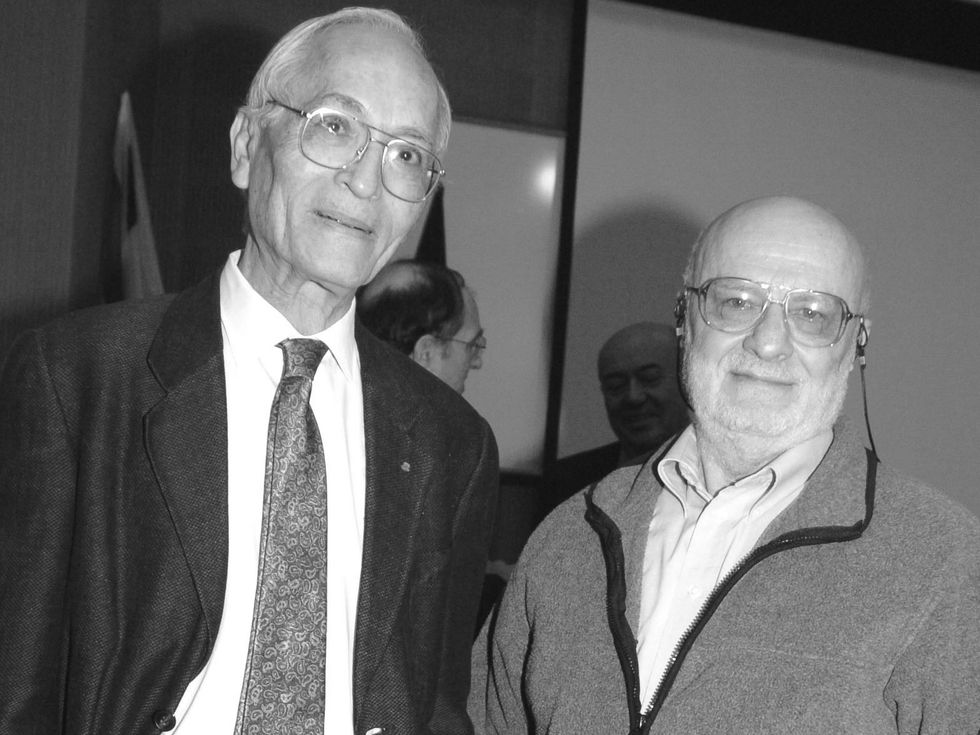

Jacob Ziv, codeveloper of the Lempel-Ziv data compression algorithm, died on 26 March at the age of 91.
The IEEE Life Fellow was awarded the 2021 IEEE Medal of Honor “for fundamental contributions to information theory and data compression technology, and for distinguished research leadership.”
Ziv, an electrical engineering professor at the Technion—the Israel Institute of Technology, in Haifa—and his colleague Abraham Lempel perfected the lossless compression technique, enabling perfect data reconstruction. With lossless algorithms, as an IEEE Spectrum article explained in 2021, “bits disappear, making the data file dramatically smaller and thus easier to store and transmit,” but unlike lossy compression techniques such as the ones used with JPEG and MP3 files, the bits “reappear on command.”
The Lempel-Ziv data compression algorithm, which paved the way for GIF, PNG, and ZIP files, was designated an IEEE Milestone in 2004.
Ziv’s scientific contributions “changed forever the way we store, process, and transfer information,” the Technion’s president, physicist Uri Sivan, wrote in a tribute to Ziv. “He was an inspiration to all of us—a beacon of scientific excellence [and] a symbol of science’s great potential to ignite technological revolutions that affect all of mankind.”
Information and communication theory pioneer
Born in Israel, Ziv received bachelor’s and master’s degrees in electrical engineering from the Technion in 1954 and 1957. He began his career in 1955 as a research engineer with the Israeli Ministry of Defense, where his work focused on communications systems.
He was selected in 1959 as one of a handful of researchers from Israel’s defense lab to study abroad. He moved to the United States to attend MIT, where he earned a Ph.D. in electrical engineering in 1962. While at MIT, he held a part-time job as a research engineer in the applied science division at U.S. defense contractor Melpar, in Watertown, Mass. After a year, he moved back to Israel and rejoined the Ministry of Defense as head of its communications division.
He returned to the United States in 1968 to work at Bell Telephone Laboratories, in Murray Hill, N.J. The following year, he and Moshe Zakai published a paper in IEEE Transactions in Information Theory describing the Ziv-Zakai bound, a method to determine whether a processor is getting the most accurate information possible from a given signal.
Ziv relocated to Israel in 1970, this time to join the Technion as a professor of electrical engineering. He served as dean of the EE faculty from 1974 to 1976 and vice president of academic affairs from 1978 to 1982. He taught classes at the institute throughout his career, punctuated by three research sabbaticals in the information research department at Bell Labs.
At the Technion and at Bell, Ziv conducted research in data compression, information theory, and statistical communications. He made several contributions to the theory of error-correcting codes and an encoding scheme that transmits messages as binary numbers so that they can be recovered even if some bits are accidentally flipped.
 Jacob Ziv [left] and Abraham Lempel published algorithms for lossless data compression in 1977 and 1978, both in the IEEE Transactions on Information Theory. The methods, which became known as LZ77 and LZ78, are still in use. Jacob Ziv/Technion
Jacob Ziv [left] and Abraham Lempel published algorithms for lossless data compression in 1977 and 1978, both in the IEEE Transactions on Information Theory. The methods, which became known as LZ77 and LZ78, are still in use. Jacob Ziv/Technion
Lempel-Ziv compression algorithms
It was in his early days at the Technion that Ziv met Lempel, a computer scientist who shared his interest in improving lossless data compression. Ziv told IEEE Spectrum that he and Lempel were the “perfect match” for the project: “I knew all about information theory and statistics, and Abraham was well-equipped in Boolean algebra and computer science.”
In 1977, while Ziv was on sabbatical at Bell Labs, he and Lempel published a paper in the IEEE Transactions on Information Theory, “A Universal Algorithm for Sequential Data Compression.” The algorithm they described was faster and more efficient than Huffman coding, which was the lossless data compression standard at the time. Ziv and Lempel’s algorithm became known as LZ77.
The new algorithm worked on any kind of data and did not require preprocessing. It needed to take only one pass at an image file in order to compress it.
That greatly reduced the time it took to analyze and compress a data file by looking for unique sequences of bits while simultaneously compressing the data, using pointers to refer to previously seen sequences. The following year, the two researchers issued a refined version, LZ78.
The two algorithms, also known as LZ1 and LZ2, paved the way for the Unix compression programs of the early 1980s as well as the WinZip and Gzip compression programs in the early 1990s. They are used today in GIF, TIFF and other image formats.
A lasting legacy
Ziv garnered several awards for his pioneering contributions to data compression. In addition to the 2021 IEEE Medal of Honor, he received an IEEE Information Theory Society Golden Jubilee Award for Technological Innovation in 1998.
He was awarded a 2017 EMET Prize (known as Israel’s Nobel Prize), an Association for Computing Machinery Kanellakis Award in 1997, and a 1995 Marconi Prize.
Ziv’s interest in education led him to opportunities beyond the Technion. He chaired the Israeli Council for Higher Education planning and grants committee from 1985 to 1991, for example. An Israel Academy of Sciences and Humanities member from 1981 until his death, he served as its president from 1995 to 2004.
In 1997 he established the Israeli National Infrastructure Forum for Research and Development to promote programs and projects in science, technology, engineering, and mathematics.
Reference: https://ift.tt/sKxeboz
No comments:
Post a Comment